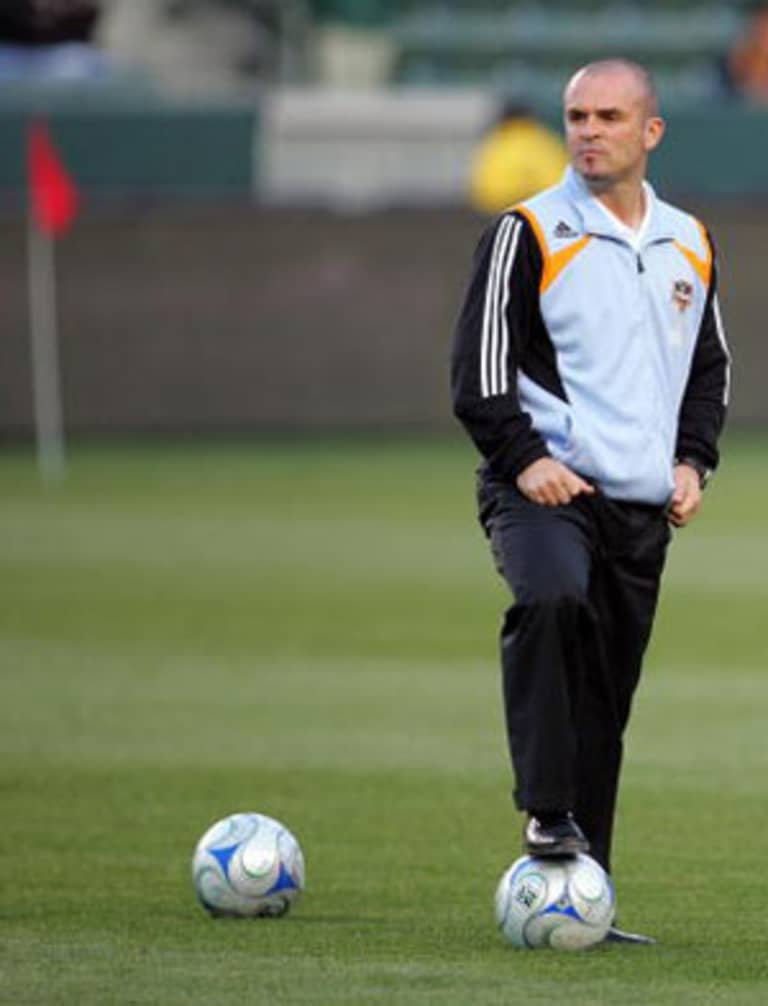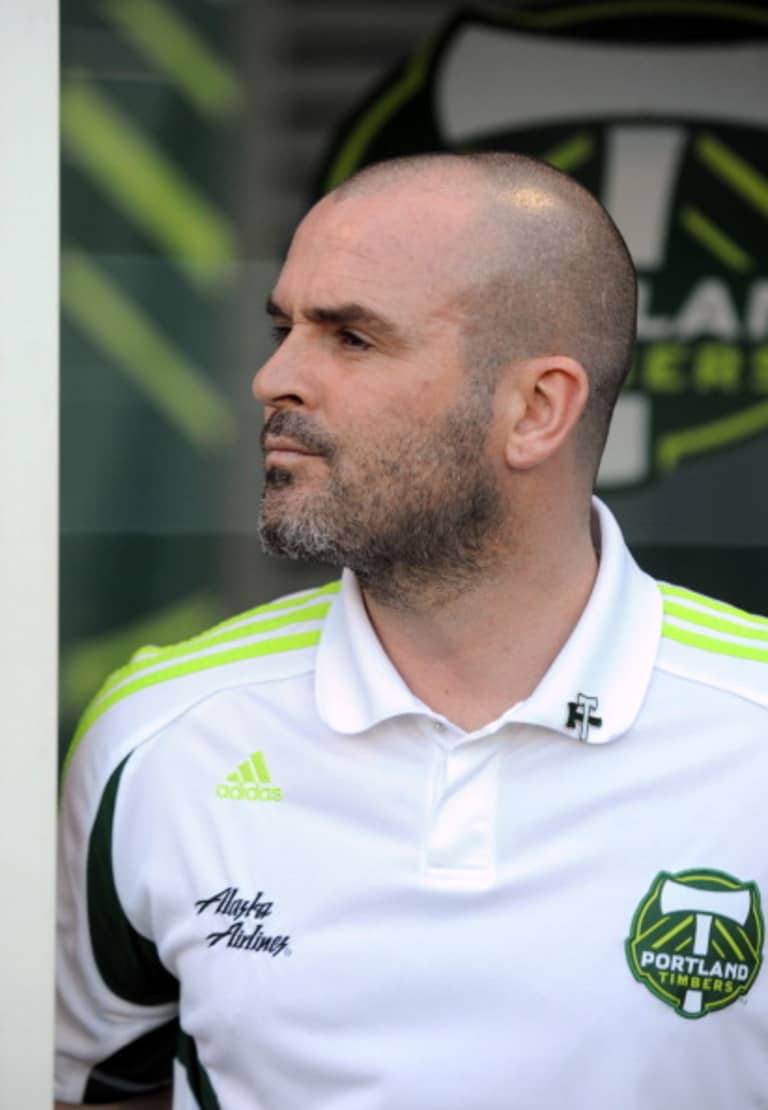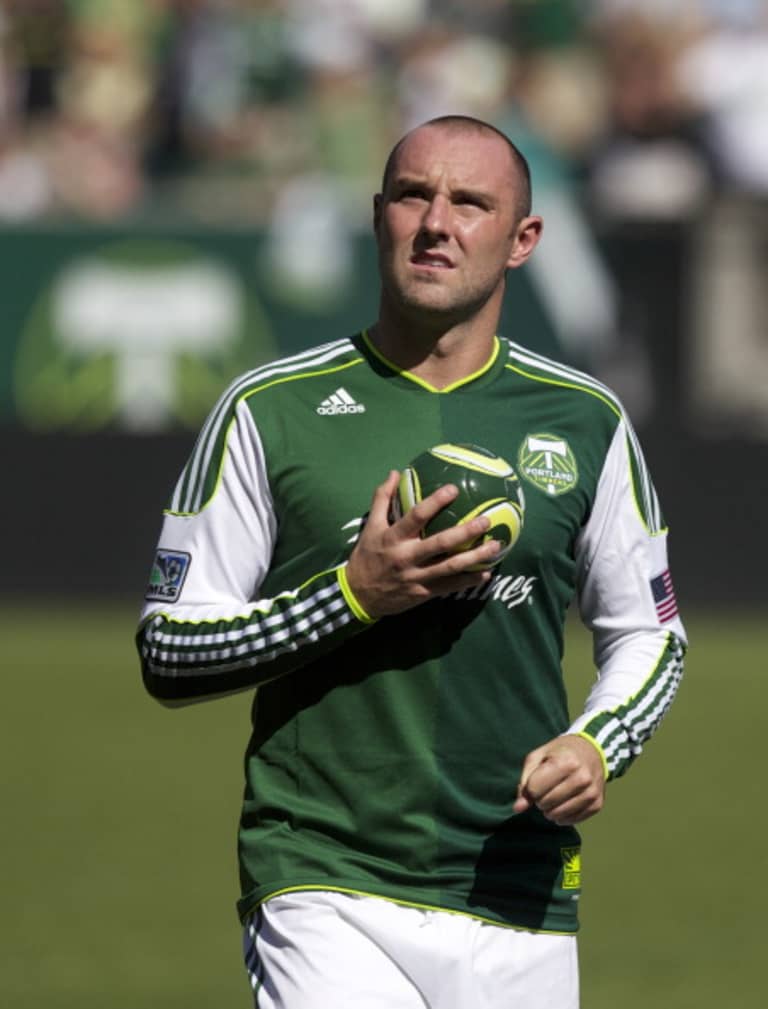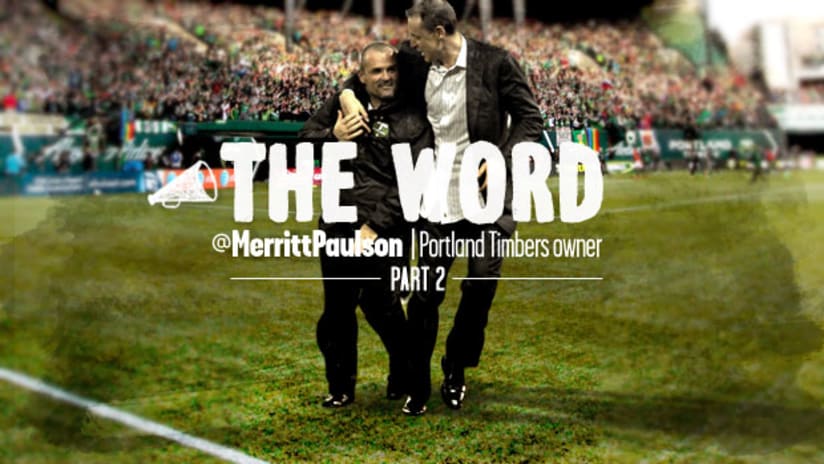"The Word" is MLSsoccer.com's weekly long-form series. In this week's second of a three-part feature, senior editor Nick Firchau examines the relationship between Portland Timbers owner and president Merritt Paulson and former head coach John Spencer, which defined the team's frustrating 2012 season. Part three of the series will run on Wednesday, April 3.
Read the first part of the series on Paulson here.
PORTLAND, Ore. – John Spencer was one of the top young minds in Major League Soccer in the summer of 2010, when he strolled to the podium during a press conference and took charge of the Portland Timbers.
He was dutifully thankful to Major League Soccer for welcoming him as a player in 2001 after a career in the English Premier League, as well as to the Houston Dynamo, who hired him as an assistant coach before they won back-to-back MLS Cups in 2006 and 2007. His playing career and his success as a coach – plus an endearing, outspoken demeanor and an unmistakable Scottish brogue later used in a television commercial for sponsor Alaska Airlines – helped push Spencer to the front of a long line of candidates clamoring to lead the Timbers' graduation to Major League Soccer.

John Spencer won two MLS Cups as an assistant coach with the Houston Dynamo, and leveraged that success into his first head coaching job with the Portland Timbers ahead of their 2011 debut.
- Getty Images
"I think there are a few hundred people all around the world that would like to be standing in my position," Spencer told the media when he was officially introduced in August 2010. "I'm hoping to be here for a long, long time.
"And Merritt," Spencer said, glancing at Paulson, "I know you crave entertaining football. I'll try my very best."
The Timbers nearly made the playoffs during Spencer's first year, and that success – and the preseason pickup of Scottish striker Kris Boyd, a move Spencer likened in the Scottish press to Glasgow club Rangers picking up Lionel Messi – prompted an enthusiastic Paulson to make a declaration that the team would make the playoffs in Year 2.
Boyd scored in the team’s season opener on national television, a 3-1 win over the Philadelphia Union played in a steady spring rain in Portland. But then the Timbers lost five of their next seven games, including a sobering 2-0 defeat on the road to the expansion Montreal Impact in late April when the team gave up two goals in the final 15 minutes.
LIKE LONG FORM? DOWNLOAD THE OVERLAP MAGAZINE APP!
A month later, they once again coughed up a late goal, this time to the rival Vancouver Whitecaps in a 1-1 draw, and the pressure began to build ahead of a seemingly sure-fire win in the third round of US Open Cup against upstart amateur team Cal FC on May 30 in Portland. The Timbers predictably dominated all facets of the game and outshot their overmatched opponents 43-11, but Boyd skied a penalty kick into the seats above the goal in the 80th minute.
Cal FC eventually scored early into extra time, eliminating the Timbers and sending Paulson back to his Twitter account to try and explain what had happened.
“Don't know what to say to our supporters,” he tweeted, “other than I am sorry and utterly embarrassed.”
WATCH: Portland Timbers owner and president Merritt Paulson discusses the team's disappointing start to the season in April 2012.
Spencer and the Timbers stunned Seattle 2-1 at JELD-WEN Field on June 24, but they failed to score a single goal during three losses over a five-week span that summer. The final result of that stretch – a sloppy 3-0 loss at Real Salt Lake on July 7 that saw five Timbers players issued a yellow card and Designated Player Diego Chará booted in the 73rd minute for his second caution – was also Spencer’s last game at the helm. He was fired on July 9.
Wilkinson and Paulson have each kept remarkably quiet ever since about the specific reasons behind the decision, and Spencer has disappeared completely from the public eye. Paulson has long attributed the split to “fundamental philosophical differences” between the club and their former head coach, without expounding much further on what exactly those differences were.
But a source close to the situation told MLSsoccer.com that the relationship between Spencer and the duo of Paulson and Wilkinson became untenable as the season slipped away last summer, in part because Paulson wanted more transparency from Spencer about on-field decisions, and Spencer didn’t respect his superiors because of their lack of soccer expertise.
---
Much of the problem stemmed from a fundamentally different approach on how to run the team. Paulson and Wilkinson have long believed in an analytical and quantifiable approach to the game dependent on statistical breakdowns of players’ performances. Spencer leaned more on the instincts honed as a player himself, and often disregarded the value of Wilkinson’s player research. Spencer, as one source told MLSsoccer.com, “was never, ever a tactical guy like they wanted him to be.”
Wilkinson told MLSsoccer.com last week that while the club does not rely completely on its analytical research when making personnel decisions, they do focus heavily on factors like what each player earns compared to his counterparts around the league at that position, how many minutes he plays, his contract length and his age compared to others in the league.
Wilkinson has also spent years studying key performance indicators for successful teams, analyzing how much each team spends per position and how it translates to the simplest statistics of all: wins and losses.
“It’s a lot of numbers,” Wilkinson said. “And it helps us as an organization to ask, ‘Are we truly making progress, or are we standing still?’ And this year, along with the second half of last year, I’ve taken a lot of time involving Merritt in the process and making sure the team he invests in is the team is the one he wants to see on a week-to-week basis.”

Sources told MLSsoccer.com that Spencer stopped attending meetings with the Timbers front office during their 2012 slide, and was reluctant to let Paulson know about his decision-making process.
- Getty Images
As the Timbers stumbled out of the gate last spring and struggled to recover by summer, any fundamental issues between the Paulson-Wilkinson duo and Spencer only got worse. Spencer, frustrated by what he interpreted as meddling from an overzealous owner still very much learning his way in professional soccer, eventually began skipping the group’s weekly Wednesday meetings, and, according to the source, was reluctant to let Paulson in on the decisions that affected which players saw the field and which didn’t.
Spencer, for his part, was out of his element with a hands-on personality like Paulson. During his time with the Dynamo, the coaching staff had been left almost completely alone by ownership group AEG, and sometimes met with representatives just once a year, at the end of the season. Part of that was due to the club’s success – Houston made the playoffs every year from 2006-09 with Kinnear at the helm and have reached MLS Cup each of the past two seasons – but it set a precedent during Spencer’s coaching career that owners let the coaches coach. Owners don't ask questions about each and every move.
That strategy wouldn’t work for Paulson, who likes to factor into decisions in a number of departments inside the Timbers organization, and wants to learn more about the ones he hasn’t grasped yet. And he has always asked for some level of transparency from his technical staff in order to learn the intricacies of player management, even dating back to his first days on the job in 2007.
“I don’t want to ever tell somebody who to play or who to sign or who to trade,” Paulson says, adding that he allowed Wilkinson and Spencer to recruit and scout players without any interference. “But I want to understand why they’re playing the people they’re playing. I want to know there are no insecurities there when it comes to someone being able to be an open book.
“I want people who help me understand that. I’ve come way up the learning curve in the past six years on soccer, but I’m not going to know what a professional soccer player knows.”
Even as the team began slipping, Spencer was hesitant to change, and certainly reluctant to take input from Wilkinson and Paulson, neither of whom had played at the level Spencer had or had any success in MLS. Wilkinson had appeared in 33 matches for the New Zealand national team and with clubs in Australia, Singapore and Ireland as player, but Spencer figured he was the most experienced to make decisions when it came to the three men in charge of the Timbers.
“John walked into the room saying, ‘I know what I’m doing better than anybody else; this is no big deal,’” said longtime Portland Oregonian columnist John Canzano, who befriended both Paulson and Spencer while covering the team. “And when things didn’t go right, he had a hard time taking direction from other people.
“Ultimately, if you’re not getting results, you better be coachable yourself.”
READ THE COMPLETE ARCHIVES OF "THE WORD"
The relationship grew so strained last year that Spencer began telling a story to some Timbers followers that Paulson had at one point taken to online blogs to try and solve the team’s on-field problems. Spencer alleged that Paulson printed out a proposed lineup by a blogger and took the paper to Spencer’s office, then demanded to know why the Timbers weren’t considering using the lineup.
WATCH: Spencer and striker Kris Boyd talk about the Timbers' upset loss to amateur side Cal FC during the 2012 US Open Cup.
“Because,” Spencer said when he looked at the paper, “there are 12 players in that lineup.”
When that story was recounted to Paulson in February, he laughed and called it “categorically false,” insisting that he never sought out fantasy soccer solutions to real-life problems. But even if the details of Spencer’s story are untrue, he did tell the story to people close to the team, loudly subverting the club’s owner so much to question Paulson’s basic understanding of the game. The damage, it seemed, was irreparable.
“The relationship was not good in the end, and it was probably deteriorating all year to that point,” said Geoffrey Arnold, the Timbers beat writer for TheOregonian. “You have two very, very strong personalities in Merritt and John, and if John didn’t like you, he told you. And that took Merritt aback, because he’s used to you basically doing what he asks and doing what he says.
“John didn’t always comply with that. He just didn’t. It wasn’t his personality.”
---
There are other allegations. One source told MLSsoccer.com that Spencer would threaten Timbers players they wouldn’t get paid because they played so poorly on the road, while another said Spencer was verbally abusive to Ghananian midfielder Kalif Alahassan, and that rebuilding the 22-year-old’s confidence has become a top priority for the club since Spencer left. Another insisted Spencer was reluctant to add Spanish-speaking players to the team.
The Cal FC loss was the nadir for Paulson, Wilkinson and Spencer. Not only was it an embarrassing defeat to an amateur team in front of the home crowd, but Spencer’s star striker Boyd was largely to blame. Not to mention a win would have meant a lucrative home game in the next round of the tournament against Seattle, handing the Timbers roughly $400,000 in revenue from hosting the match and more potential income from a TV rights deal with Fox Soccer to broadcast the game.
And, perhaps most importantly, a chance to beat Seattle general manager Adrian Hanauer and the Sounders in the very tournament they’d staked their reputation on for years.

Boyd finished with seven goals in 26 games for the Timbers in 2012, but failed to score over his last nine appearances and eventually lost his starting role with the team.
- Getty Images
But instead the Timbers flopped in what Arnold called “the most humiliating defeat in this franchise’s history, going all the way back to 1975.” While rumors lingered that Paulson and Spencer got into a verbal altercation in the coach’s office following the Cal FC match, Paulson insists their conversations got heated only once during Spencer’s tenure, following a 2012 regular-season match he refused to identify.
Still, Paulson knew the road ahead was unmanageable with Spencer still in charge of the team, and shortly after the Cal FC loss, he called Canzano. Before the season, Paulson had promised his friend he would not become a reactionary owner that would fire a head coach midseason, much like his idol George Steinbrenner did with stunning regularity.
But this, as Paulson explained, was too much.
“I know you’re gonna kill me for this,” Paulson said, “but we have to make this move.”
Said Canzano: “He could have gone one of two ways. He was either going to implode and lose it, or he was going to gather himself and say, ‘Something isn’t working here. I need to make an adjustment.’”
Paulson nearly cried when he told the media about the move on July 9. It was a rare and candid bit of emotion rarely seen from owners in professional sports, but to know Paulson is to expect the unexpected. He was devastated by the end of a friendship.
WATCH: Paulson and GM Gavin Wilkinson discuss the decision to let Spencer go in July 2012, due to "fundamental philosophical differences."
“There’s nothing I like more during our games than looking down at John when we score a goal, and see him fist-pumping, looking up at me,” Paulson said at the time, fighting off tears. “I like him a lot. This is a very painful decision to make.”
Wilkinson, who was by Paulson’s side during the press conference, affirmed last week that the decision was made in part because of Spencer’s unwillingness to accept a “level of involvement” from his superiors. But he also praised the former coach for his role in the early days of Portland’s graduation to MLS.
“I still believe John was the absolute perfect coach for the Portland Timbers, in getting the brand up and running.,” Wilkinson said. “The feeling may not be mutual, but I have a ton of respect for him for what he’s done in the game, and what he will do in the future.”
Spencer did not respond to attempts to contact him by MLSsoccer.com for this article. Despite his strong connections to Europe, Houston and Denver, Timbers fans have spotted him at coffee shops and grocery stores around Portland, indicating he surprisingly still hasn’t strayed far since he was let go 16 months ago.
Canzano caught him sitting courtside for an NBA game between the Portland Trailblazers and Boston Celtics in late February, and asked him about the firing.
Said Spencer: "There's always three sides to every story."
Part three of this series will appear on MLSsoccer.com on Wednesday, April 3.











